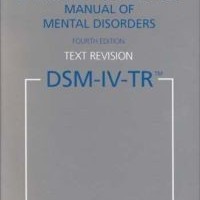‘Pathologising unhappiness’ – a response
In today’s “The Age”, Sam De Brito has written an article called ‘Pathologising Unhappiness‘ in which he refers to an interview between Katherine Rowland and psychotherapist and author, Gary Greenberg. (You can read the full interview here.)
De Brito’s article discusses Greenberg’s views on the DSM (Diagnostic and Statistical Manual of Mental Disorders) which is referred to several times as a ‘bible’. Greenberg goes as far to say that it is as important to mental health professionals ”as the Constitution is to US government or the Bible is to Christians“.
I should point out that Greenberg is not a psychiatrist, he is a psychotherapist. That doesn’t make his opinion less valid, but a psychotherapist – who is not medically trained – will be seeing patients who are very different to the patients that I see as a psychiatrist. He is very unlikely to be seeing people who are severely mentally ill, who require hospitalisation for a crippling psychiatric illness. Generally, to be suitable for psychotherapy, a patient must be reasonably well functioning, and be insightful into their condition. So, Greenberg’s opinion is skewed by the fact that he is likely to be seeing patients with mild to moderate anxiety and depression as well as unhappiness with their lives. Perhaps this is why De Brito suggests that mental illness is the ‘new delusional denial of human suffering’.
I take issue with a few of De Brito’s comments in his article though, particularly when he suggests that we ‘shrinks‘ have sinister motives:

‘once you have a disease or “disorder”, then drug companies and doctors – specifically psychiatrists and psychologists - can charge you to “cure” it or at least pretend they know what’s going on, when often they do not.’
Hmm.
Let me try to explain some of my complicated feelings about DSM. It is certainly not held with the importance that Greenberg suggests, as my Bible or Constitution, but it is necessary for many reasons. A large part of my job as a child psychiatrist is making diagnoses in children who present with all sorts of behavioural disturbances, and I am the first to admit that it can be complicated to work out what is a ‘normal’ response to life events, and what is ‘pathological.’
When I started training in psychiatry, in the UK, we used the European diagnostic system: ICD-10. These manuals essentially have lists of potential diagnoses, and each has a list of criteria under it, a number of which must be met for the patient to be diagnosed with that condition. It can be fairly straightforward for some conditions, but any psychiatrist will tell you that patients don’t always fit into neat boxes, particularly children. A child psychiatrist’s job is to look not only at the child’s presenting symptoms, but to put them into a developmental context. I often see children who may look as if they are, for example, on the autistic spectrum because they have disordered social skills, but really their problems are in the context of a traumatic background/medical condition/anxiety disorder etc.
But diagnostic criteria are necessary: they allow for easier communication between professionals, they are essential for research, and people of course like to have a ‘diagnosis’ particularly if it has a treatment.
The difficulty in psychiatry is that we don’t have a simple test to make a diagnosis. If someone has diabetes, we can test their blood sugar; we can do an xray for pneumonia; a lab test for an infection. Psychiatrists have to use the only information we have: history and observation of behaviour.
One big issue I have with using diagnostic criteria in children is that other agencies – such as schools – will only allocate funding based on diagnosis, not need. I often see children referred by school psychologists for a diagnosis only, and they hope that diagnosis is one which allows them to apply for money to employ a teacher’s aide to help that child in the classroom. I often find myself in an ethical dilemma where I know that a child would benefit from help in the classroom, but they don’t quite meet all the criteria for the ‘right’ diagnosis. Services should be needs based, not diagnosis based.
It is important that the current DSM undergoes a revision to make sure that the diagnoses are evidence based and up to date with the ever expanding knowledge of psychiatric illness, but clinicians, government and non government agencies should remember that we are trying to help a child, not a label. A good psychiatrist will be able to sort through the complicated social, developmental and medical issues that a patient presents with and work out a management plan based on an individual, not a manual. And I am certainly not in cahoots with pharmaceutical companies who do have a history of trying to medicalise normal behaviour (and that’s a whole other blog post…)
As a psychiatrist, I am not a huge fan of DSM, but I certainly don’t pretend to know what’s going on if I don’t, and I don’t see it as an opportunity -as has been suggested today – to rub my hands in glee and charge lots of money for snake-oil.
And any person who has suffered a crippling mental illness will attest to the fact that with or without a controversial diagnostic manual, mental illness is very real.



